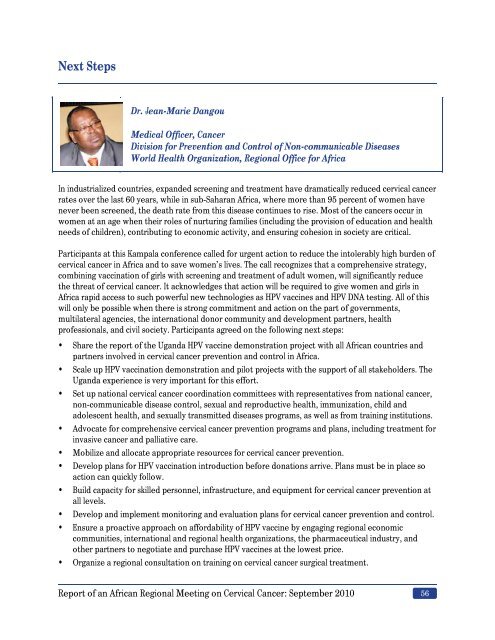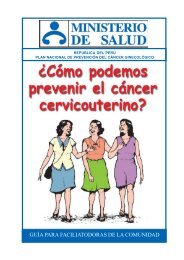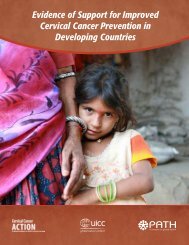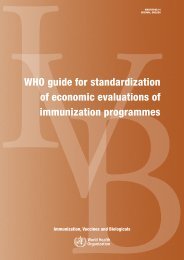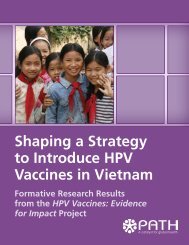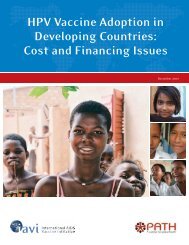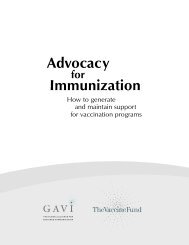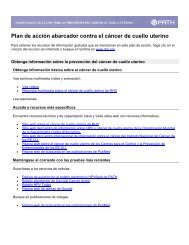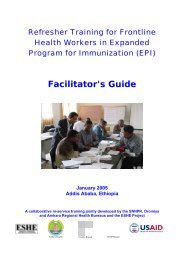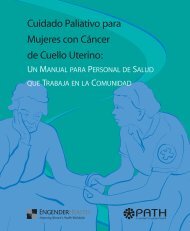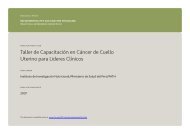Download file, English (1 MB PDF) - RHO
Download file, English (1 MB PDF) - RHO
Download file, English (1 MB PDF) - RHO
Create successful ePaper yourself
Turn your PDF publications into a flip-book with our unique Google optimized e-Paper software.
Next Steps<br />
Dr. Jean-Marie Dangou<br />
Medical Officer, Cancer<br />
Division for Prevention and Control of Non-communicable Diseases<br />
World Health Organization, Regional Office for Africa<br />
In industrialized countries, expanded screening and treatment have dramatically reduced cervical cancer<br />
rates over the last 60 years, while in sub-Saharan Africa, where more than 95 percent of women have<br />
never been screened, the death rate from this disease continues to rise. Most of the cancers occur in<br />
women at an age when their roles of nurturing families (including the provision of education and health<br />
needs of children), contributing to economic activity, and ensuring cohesion in society are critical.<br />
Participants at this Kampala conference called for urgent action to reduce the intolerably high burden of<br />
cervical cancer in Africa and to save women’s lives. The call recognizes that a comprehensive strategy,<br />
combining vaccination of girls with screening and treatment of adult women, will significantly reduce<br />
the threat of cervical cancer. It acknowledges that action will be required to give women and girls in<br />
Africa rapid access to such powerful new technologies as HPV vaccines and HPV DNA testing. All of this<br />
will only be possible when there is strong commitment and action on the part of governments,<br />
multilateral agencies, the international donor community and development partners, health<br />
professionals, and civil society. Participants agreed on the following next steps:<br />
• Share the report of the Uganda HPV vaccine demonstration project with all African countries and<br />
partners involved in cervical cancer prevention and control in Africa.<br />
• Scale up HPV vaccination demonstration and pilot projects with the support of all stakeholders. The<br />
Uganda experience is very important for this effort.<br />
• Set up national cervical cancer coordination committees with representatives from national cancer,<br />
non-communicable disease control, sexual and reproductive health, immunization, child and<br />
adolescent health, and sexually transmitted diseases programs, as well as from training institutions.<br />
• Advocate for comprehensive cervical cancer prevention programs and plans, including treatment for<br />
invasive cancer and palliative care.<br />
• Mobilize and allocate appropriate resources for cervical cancer prevention.<br />
• Develop plans for HPV vaccination introduction before donations arrive. Plans must be in place so<br />
action can quickly follow.<br />
• Build capacity for skilled personnel, infrastructure, and equipment for cervical cancer prevention at<br />
all levels.<br />
• Develop and implement monitoring and evaluation plans for cervical cancer prevention and control.<br />
• Ensure a proactive approach on affordability of HPV vaccine by engaging regional economic<br />
communities, international and regional health organizations, the pharmaceutical industry, and<br />
other partners to negotiate and purchase HPV vaccines at the lowest price.<br />
• Organize a regional consultation on training on cervical cancer surgical treatment.<br />
Report of an African Regional Meeting on Cervical Cancer: September 2010 56


